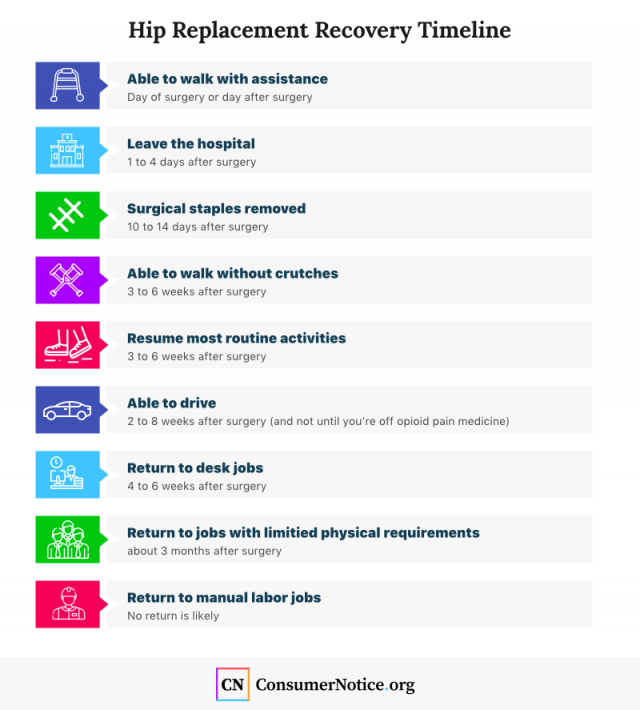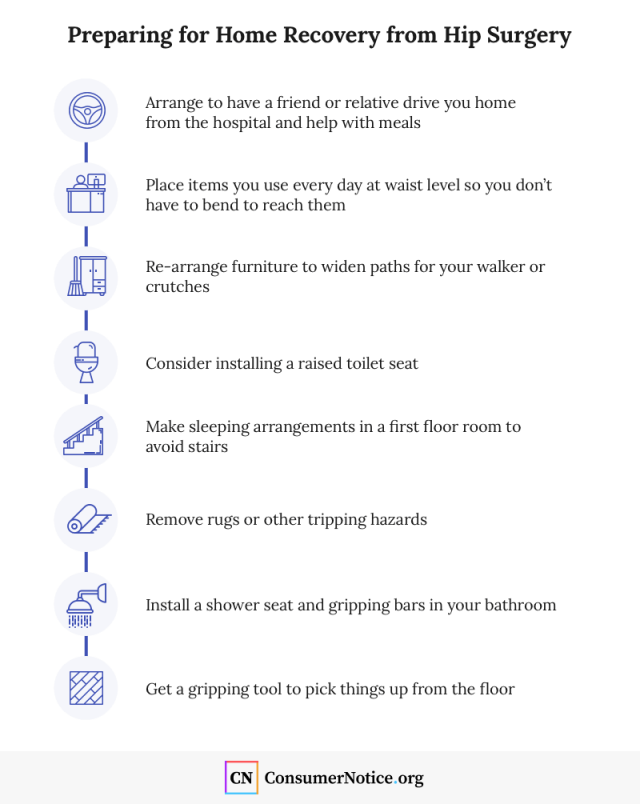Hip Replacement Recovery
Hip replacement recovery can take months. But there are things just about anyone can do to cut the time it takes to fully heal. Advance planning can also make your recovery time more comfortable and convenient.

You should begin planning for hip replacement recovery before you ever go in for surgery.
Hip replacement is a major operation and it takes three to six months for most people to recover from it. Depending on health and other factors, some people may need as much as a full year before they are able to resume their old routine.
Some things to consider include: how to modify your home and schedule for recovery; questions to ask your doctor about recovering from surgery; and how to spot complications that may arise.
Timeline: What to Expect After Hip Replacement Surgery
Hip replacement recovery time differs from person to person. You may spend one to four days in the hospital after surgery. Expect another three to six months to fully recover.

Following your surgeon’s instructions can shorten the time it takes to get back into your routine following a hip replacement operation. Physical therapy or an exercise program can reduce joint pain and stiffness after you receive a new artificial hip.
Preparing Your Home for Hip Surgery Recovery
You should prepare your home for your hip replacement recovery in the weeks before you have surgery.
You won’t be able to get around as well after the procedure. Routine tasks may be impossible for some time after you come home. And it could take days or weeks to resume even the simplest routines, such as cooking or running errands.

Questions to Ask Your Surgeon About Hip Replacement Recovery
Recovering from hip surgery is different for everyone. Things like your age, weight and overall health can make a difference in how quickly you will recover.
But your surgeon should have a pretty good idea of what you may expect in your particular case. Don’t be afraid to ask your doctor questions. The answers may make it easier for you to understand how well you are progressing after surgery.
Questions You Should Ask Your Doctor After Hip Surgery
- Do I need to be careful about how I sit or move around?
- How do I take care of the incision?
- How long do I have to sleep on my back after hip replacement?
- How long will I have to use crutches or a walker?
- How much walking should I do?
- What are the warning signs that something is wrong with my new hip?
- What exercises should I do and how often?
- When can I drive after hip surgery?
- When will I be able to return to activities like golf, tennis, biking, running or hiking?
- Will I have pain medicine when I go home and how do I take them?
- Will I need to take blood thinners and what are the risks?
Physical Therapy and Exercise Following Hip Surgery
Daily physical activity and exercise, beginning as early as the day of your surgery, is necessary for a successful recovery. It is important to get into a regular routine.
A physical therapist can recommend strengthening and mobility exercises following surgery. These will improve blood flow around the new hip and improve the strength of your muscles. They will also reduce the amount of scar tissue and give your new hip a wider range of motion.
Following your therapist’s instructions will help you walk without a walker, crutches or cane sooner.
You may experience some pain during your therapy sessions. Ask your doctor to recommend a pain reliever you can take a half hour before your exercises. Use a heated compress to warm up muscles around the hip before exercising and a cold compress immediately after to reduce soreness. These can each be used for 10 or 20 minutes.
Getting Back to Sports and Other Activities After Hip Surgery
You should talk to your doctor about when it is safe for you to return to sports or other physical activities you enjoy.
Low-impact sports like swimming, cycling, golf and hiking are generally considered safe for people with a hip replacement. But sports with a greater risk of falling or high-impact sports are not usually recommended. These include downhill skiing, running, basketball, soccer, softball, racquetball and yoga. You should talk with your surgeon before resuming any of these or related sports.
Tips for Improving Your Hip Recovery
Carefully following your doctor’s instruction can improve your chances for a speedy recovery from hip surgery. Precautions differ based on the surgeon’s preferences and technique, according to the American Academy of Orthopaedic Surgeons. Working on your own and with a physical therapist to build up strength and mobility may also get you back to a normal routine sooner.
A lot of things go into a successful recovery. You’ll need to prevent infection, watch for complications, build muscle around the new hip and avoid unnecessary strain on the implant while you heal.
This may sound like a difficult balancing act but following a few simple tips can keep you on track.
15 Tips to Improve Your Recovery
- Adopt a healthy, daily exercise routine
- Gradually increase the distance you walk
- Follow a healthy diet and watch your weight
- Keep the wound area clean and dry
- Ask your doctor how and when to change the wound dressing
- Follow your doctor’s instructions on how long to wait before showering and bathing
- Notify your doctor immediately if you notice swelling, redness or drainage around the wound
- Take all medications as directed by your doctor
- Make sure your doctor is aware of all medicines and supplements you are taking
- Relieve routine swelling by elevating your leg slightly and applying ice
- Avoid alcohol
- Drink plenty of water
- Consult with your doctor about when it is safe for you to resume sexual activity
- Ask your doctor when you may resume recreational activities or sports
- Check with your doctor before flying on an airplane
Signs and Symptoms of Hip Replacement Complications
In most cases, a new hip replacement should last 15 to 20 years. But some hip devices will fail sooner. It’s important to watch for warning signs of a faulty implant.
The risk of complications is much lower than in the past. But when complications do happen, they can become serious. It is important to let you doctor know at the first sign of a problem to prevent things from becoming worse.
Notify your doctor immediately if you experience signs or symptoms of a hip replacement complication, such as:
- A limp or change in your ability to walk
- Drainage around the wound
- Fever higher than 100 degrees
- Increasing pain
- Increasing redness, swelling or tenderness around the wound
- Noise such as popping, grinding, squeaking or clicking
- Pain in the groin, hip or leg
- Pain or swelling around or near the hip joint, thigh, calf, ankle or foot
- Shaking or chills
- Tenderness below the knee
Because hip replacement is a major surgery, there is a risk of blood clots that could damage the heart or lungs. Your surgeon may place you on a blood thinner for a while following surgery.
You may also notice a change in leg length because of muscles contracting. This is rare and stretching and strengthening those muscles will help.
The most serious complications patients may experience during recovery include infections, fractures, dislocation or the implant loosening. Any of these may require surgery to repair or replace the implant. Nearly 30,000 hip replacement lawsuits blame defective implants for causing these complications.
10 Cited Research Articles
Consumernotice.org adheres to the highest ethical standards for content production and references only credible sources of information, including government reports, interviews with experts, highly regarded nonprofit organizations, peer-reviewed journals, court records and academic organizations. You can learn more about our dedication to relevance, accuracy and transparency by reading our editorial policy.
- American Academy of Orthopaedic Surgeons. (2014, June). Total Joint Replacement. Retrieved from https://orthoinfo.aaos.org/en/treatment/total-joint-replacement
- Esposito, L. and Miller, A.M. (2019, April 25). Your Guide to a Total Hip Replacement. U.S. News and World Report. Retrieved from https://health.usnews.com/health-news/patient-advice/articles/total-hip-replacement
- Foran, J.R.H. (2018, December). Activities After Hip Replacement. American Academy of Orthopaedic Surgeons. Retrieved from https://orthoinfo.aaos.org/en/recovery/activities-after-hip-replacement/
- Hansen, E.N. (2013, March 20). Total Hip Replacement Surgery Recovery. Arthritis-Health. Retrieved from https://www.arthritis-health.com/surgery/hip-surgery/total-hip-replacement-surgery-recovery
- Ma, C.B. (2019, March 17). Hip or Knee Replacement – After – What to Ask Your Doctor. MedlinePlus. Retrieved from https://medlineplus.gov/ency/patientinstructions/000232.htm
- Mayo Clinic. (2018, May 29). Hip Replacement. Retrieved from https://www.mayoclinic.org/tests-procedures/hip-replacement/about/pac-20385042
- National Institutes of Health. (2016, July 30). Hip Replacement Surgery. Retrieved from https://www.niams.nih.gov/health-topics/hip-replacement-surgery#8
- Orozco, F.R. (2017, June 29). 5 Tips for a Successful Total Hip Replacement Recovery. Rothman Orthopaedics. Retrieved from https://rothmanortho.com/stories/blog/total-hip-replacement-recovery
- Reinhardt, C. (2013, September 17). Returning to Activity After a Hip Replacement. Hospital for Special Surgery. Retrieved from https://www.hss.edu/playbook/returning-to-activity-after-a-hip-replacement/
- U.S. Food and Drug Administration. (2019, March 15). General Information About Hip Implants. Retrieved from https://www.fda.gov/medical-devices/metal-metal-hip-implants/general-information-about-hip-implants
Calling this number connects you with a Consumer Notice, LLC representative. We will direct you to one of our trusted legal partners for a free case review.
Consumer Notice, LLC's trusted legal partners support the organization's mission to keep people safe from dangerous drugs and medical devices. For more information, visit our partners page.
877-530-8067

